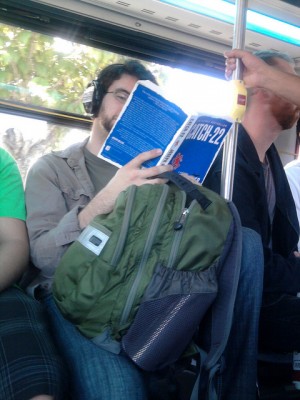 Most of us know how to reset our computers and other tech devices but how do we reset ourselves? I don’t mean things like our body clock — every seasoned traveler has their own way to combat jet-lag — but what happens when our mind gets clogged? As a writer, there are times when I feel like nothing’s going in or out and I want some sort of caustic brain-cleaner to get unstuck. The simplest brain-cleaner for me seems to be a good book.
Most of us know how to reset our computers and other tech devices but how do we reset ourselves? I don’t mean things like our body clock — every seasoned traveler has their own way to combat jet-lag — but what happens when our mind gets clogged? As a writer, there are times when I feel like nothing’s going in or out and I want some sort of caustic brain-cleaner to get unstuck. The simplest brain-cleaner for me seems to be a good book.
I read all the time and usually have three or four or more books on the go at any given time, but when I read-to-reset, I will pick a book and focus on reading it in long stretches, rather than trying to do other things. Reading time supplants passive time-consuming activities such as watching movies or aimlessly web-surfing which I am apt to do when creativity stalls.
Sometimes, I consciously pick a book and focus, but more often, I find that a book will grab me before I recognize my need to reset. As the story carries me along and my mind fires off new ideas on tangents over synapses I try to capture some of those ideas, but only if they don’t interrupt my experience of submerging myself in that world.
 Basically the book needs to have something different enough to trigger those tangents — whether it is the setting, the plot, or the mechanics — but not so different that I find it difficult to read. If I have to stop to re-read a passage or look up vocabulary, or anything else that slows me down, I will not be able to get swept up. Finally, it needs to be a physical book — I don’t want to be interrupted by a low battery, weak signal, or prompts from social media apps, and I want it to be completely portable.
Basically the book needs to have something different enough to trigger those tangents — whether it is the setting, the plot, or the mechanics — but not so different that I find it difficult to read. If I have to stop to re-read a passage or look up vocabulary, or anything else that slows me down, I will not be able to get swept up. Finally, it needs to be a physical book — I don’t want to be interrupted by a low battery, weak signal, or prompts from social media apps, and I want it to be completely portable.
The most recent book that grabbed me was Sharp Objects by Gillian Flynn; last time was The Night Circus by Erin Morgenstern. Oddly, both were books that I wouldn’t have chosen on my own — they were selected by an online book club — but I don’t believe that is a critical aspect. In both cases, I would read everywhere, and any time I had the chance, and past my bed time just to get one more chapter. I chewed through them, but even as I was doing so, I could feel the cobwebs in my brain being brushed away.
 In Night Circus, Morgenstern builds a world where magicians feud through apprentices they raise and train into adolescence. It was this world that kept me turning the page, to see where the author would take me next. In Sharp Objects, Flynn rejects several stereotypes as the mystery unfolds, and does so without alienating the reader. I love writers who reject the obvious!
In Night Circus, Morgenstern builds a world where magicians feud through apprentices they raise and train into adolescence. It was this world that kept me turning the page, to see where the author would take me next. In Sharp Objects, Flynn rejects several stereotypes as the mystery unfolds, and does so without alienating the reader. I love writers who reject the obvious!
Both triggered ideas for my own writing and reminded me that every writer does things differently. If you are a creative worker, a regular mental reset is critical to re-stock your idea cabinet and replenish your supplies of prompts and images. Almost all creative output whether music, art, or literature is recycled from other ideas and influences, whether or not the creative chooses to acknowledge any.
Reading is my reset; what’s yours?
Photo Credits
Reading Fairy by Cheryl DeWolfe on flickr
Reading by Pedro Ribeiro Simoes on flickr
People still read by Cheryl DeWolfe on flickr


My resets … gardening – making things out of concrete – playing my guitar use to be a big one as was karate … really need to get back to those last 2!
Cheers,
Gileeeeeee
Enjoyed your story, Cheryl…I think you’ve touched on a very important point. I love how you get so much out of reading and that you know just what to do when you need that all-important reset. What’s my reset? A walk in nature 🙂 Thanks for sharing…Carol
Thanks! For a quick reset, nothing beats a walk in nature, you’re right! Sometimes, especially in the summer, I like to just lay on the ground and look at the stars, too. Nature certainly puts things in perspective.